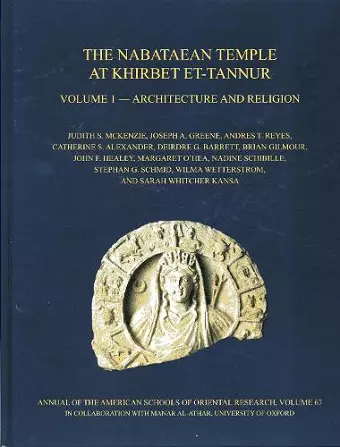The Nabataean Temple at Khirbet et-Tannur, Jordan, Volume 1
Architecture and Religion. Final Report on Nelson Glueck’s 1937 Excavation, AASOR 67
Judith S McKenzie author Joseph A Greene author Andres T Reyes author Catherine S Alexander author Deirdre G Barrett author Brian Gilmour author John F Healey author Margaret O’Hea author
Format:Hardback
Publisher:American Society of Overseas Research
Published:1st Jan '14
Currently unavailable, our supplier has not provided us a restock date

Khirbet et-Tannur is a Nabataean site dating from the second century B.C. to the fourth to sixth centuries A.D. located on a hilltop above the Wadi el-Hasa near Khirbet edh-Dharih, 70 km north of Petra along the King’s Highway. In 1937, Nelson Glueck excavated Khirbet et-Tannur on behalf of the American Schools of Oriental Research and the Department of Antiquities of Transjordan, but died before completing a final report. Now, in two extensively illustrated volumes, the results of Glueck’s excavations are finally published, based on previously unstudied excavation records and archaeological materials in the ASOR Nelson Glueck Archive at the Semitic Museum, Harvard University.
Volume 1 is devoted to the architecture of the temple, the dating of its successive phases, its sculptural decoration and iconography,and to a discussion of Nabataean religion, including the evidence for its connections with the religion of Iron Age Edom and its continuation at the temple of Khirbet et-Tannur well into the Christian era, before the A.D. 363 earthquake brought an end to the site. The volume closes with observations about iconoclasm at Khirbet et-Tannur, Khirbet edh-Dharih and Petra.
Annual of ASOR 67
'This final report on an excavation carried out decades ago is a fine achievement. McKenzie and her team should be congratulated for this important contribution to Nabataean history, architecture and art, and religious practice.'
Joseph Patrich, Journal of Roman Archaeology, Vol 30, 2017
'Rarely has this reviewer seen so useful and attractive an excavation report. This is all the more impressive because of the viscissitudes of attempting to integrate the evidence for an excavation of 80 years ago, performed under the strictures of that era and whose records and material cultuire are widely dispersed, with teh present state of the site - an immense task admirably performed by the principla investigator and her colleagues. The hundreds of plans and illustrations, both contemporary and historic and many in color, enhance the report. The nbarrative is clear, concise and informative, and the cataloges are useuful but not intrusive. This is a model publication about a little-known yet essential part of teh ancinet world, revealing a aite whose interpretation has languished for half a century.'
Duane W. Roller, American Journal of Archaeology, Vol 120 No 3 (July 2016)
'All these studies are extremely useful because they make an enormous amount of old and often unknown material available to scholars, not only those interested in the Nabataeans but also those interested in the ancient Middle East in general, in religion and rituals, in technology and in various sorts of archaeological material.
'The enormous number of documents studied by the authors, their nature (an archive), and the fact that the excavation took place more than seventy years ago added to the complexity of the project and made this publication a real tour de force.' (Laila Nehme, Bryn Mawr Classical Review, June 2015)
ISBN: 9780897570350
Dimensions: unknown
Weight: 1386g
368 pages